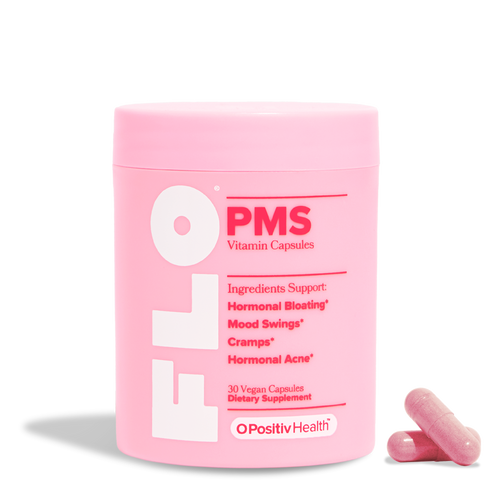It's almost impossible to find a woman who hasn't experienced bloating. While it's annoying when bloating suddenly appears, it is one of the most common PMS symptoms, and women typically expect it some time during their cycle.
Bloating doesn’t indicate that you gained weight overnight—it’s just your body holding on to extra water. After interviewing a top gynecologist, we were able to break down what period bloating actually means.
Different Types of Period Bloat
Periods are not one-size-fits-all, just like the rest of your health. In any case, knowing the different types of period bloat you may be experiencing can help you navigate your period with a little more ease and understanding. Generally speaking, hormones are to blame.
Estrogen-induced water bloat: During your period, estrogen levels fluctuate. During the times when you are estrogen-dominant (more estrogen levels than other hormones), your body may retain extra water and sodium. In some other cases, extreme bloating could be a sign of PCOS or ovarian cysts, which your gynecologist can help you determine.
Progesterone-induced bloat: While estrogen often acts as a fluid-retaining hormone, progesterone acts as a diuretic. Progesterone, a hormone that rises during the second half of your menstrual cycle, can also contribute to bloating if levels remain too low.
How Long Does Period Bloating Last?
Period bloating is most common right before and after your period, and may last anywhere from one to seven days. In some cases, extreme hormonal bloating can begin up a full week before your cycle.
How do I Get Rid of Bloating?
While we can't completely escape the clutches of pre-menstrual bloating, there are some simple steps we can take to ease the discomfort: Bloating before a period is common, says Dr. Andrei Marhol, but there are some lifestyle factors you can adjust to reduce some of it.
Add natural diuretics to your diet: It may seem counterintuitive, but drinking plenty of water can actually help flush out excess fluids and reduce water retention. Many foods have natural diuretic properties, including:
- Watermelon
- Cucumber
- Asparagus
- Peaches
- Ginger
Try FLO PMS Relief: Packed with a powerful blend of botanical ingredients like chasteberry, vitamin B6 & lemon balm, FLO PMS Relief Vitamins help to reduce excess water retention and hormonal bloating. By helping support hormone balance (the root cause of period bloating), FLO provides a holistic approach to managing that dreaded period-related bloat.
In fact, users of FLO praise its ability to relieve additional PMS symptoms, such as mood swings and hormonal acne.
Up your magnesium intake: Foods rich in magnesium, such as leafy greens, nuts, and seeds, can help regulate water balance and alleviate bloating. A high-quality magnesium glycinate supplement may ease the pain of your period by relaxing the muscles of your uterus.
Sweat it out: There’s a common myth circulation that women should avoid exercise while they’re menstruating, but our resident OBGYN, Dr. Lloyd, wants us all to know that’s completely false! The endorphins released when you exercise can help reduce stress & anxiety, promote relaxation, and decrease the sensation of pain. Getting your body moving increases blood flow, which can ease those pesky cramps and improve circulation within the pelvis to help decrease bloat. The best part—you don't need to run a marathon or do an intense HIIT workout… gentle exercises like walking, yoga, or swimming work just as well. Choose what feels right for your body.
Season your food with more herbs and less salt: Reducing sodium in your diet can help minimize water retention. Opt for fresh, whole foods and season with herbs and spices instead of excessive salt. On the flip side, herbs like peppermint, ginger, and chamomile have anti-inflammatory properties that can relax the muscles in your digestive tract and decrease bloat.
Spend Time With Yourself
A gentle reminder to all people who menstruate: Take time to pamper yourself, especially during that time of the month. Giving yourself some extra love during your period and engaging in low-impact, mindful exercise like yoga can help reduce stress, ease cramps, and make you feel more connected to your body.
Next time you feel that period bloating creeping in, take a deep breath, remind yourself that it's entirely natural, and try some of the above tricks & tips.







